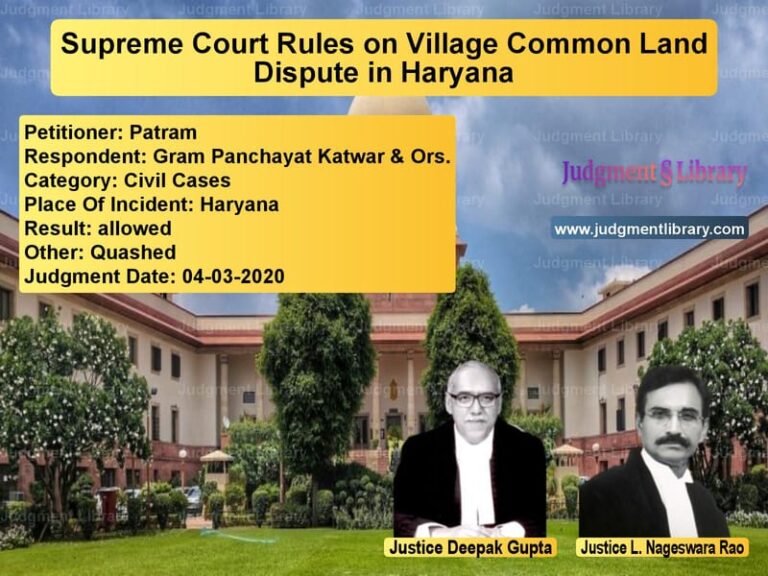Supreme Court Restores Insolvency Proceedings Against Bharath Hi Tech Builders
The case of E S Krishnamurthy & Ors. vs. M/s Bharath Hi Tech Builders Pvt. Ltd. revolves around the insolvency proceedings initiated by financial creditors against a real estate company, Bharath Hi Tech Builders Pvt. Ltd. The Supreme Court examined whether the National Company Law Tribunal (NCLT) and the National Company Law Appellate Tribunal (NCLAT) had the authority to reject the insolvency petition merely because the corporate debtor was in the process of settling claims.
Background of the Case
The appellants, a group of investors, had extended loans to Bharath Hi Tech Builders through a financing arrangement. The real estate company had entered into a Master Agreement to Sell with IDBI Trusteeship Limited and Karvy Realty (India) Limited in 2014 to raise Rs. 50 crores for land development. Later, in 2015-16, a Syndicate Loan Agreement was signed to raise an additional Rs. 18 crores from lenders.
The investors, including the appellants, alleged that the company defaulted on payments. Despite multiple assurances and extensions, the company failed to repay the loans, prompting the investors to initiate insolvency proceedings under Section 7 of the Insolvency and Bankruptcy Code (IBC) in April 2019 before the NCLT.
Decisions of NCLT and NCLAT
National Company Law Tribunal (NCLT)
The NCLT declined to admit the insolvency petition, citing the corporate debtor’s ongoing settlement process. It directed the company to settle the claims within three months and stated that creditors who were dissatisfied could approach the tribunal again.
National Company Law Appellate Tribunal (NCLAT)
When the investors appealed, the NCLAT upheld the NCLT’s decision, stating:
- The petition was dismissed at the pre-admission stage, meaning it did not go through a full insolvency hearing.
- The company had already settled claims with a significant number of investors.
- The COVID-19 pandemic had affected business operations, warranting leniency.
- Homebuyers should be prioritized in real estate insolvency cases to avoid liquidation.
Arguments Before the Supreme Court
Appellants’ Arguments
The appellants contended that:
- The NCLT and NCLAT acted beyond their jurisdiction by refusing to admit the petition despite the company’s admitted default.
- Under Section 7(5) of the IBC, the tribunal must either admit or reject an application based on whether a default occurred. It cannot compel parties to settle.
- The respondent company had only settled with a few creditors, leaving the majority unpaid.
- Delaying insolvency proceedings to allow further settlements went against the principles of the IBC.
Respondent’s Arguments
Bharath Hi Tech Builders argued that:
- It had settled claims with a significant number of investors and was actively working on resolving others.
- The IBC is meant for resolving financial distress, not merely recovering debts.
- The appellants did not meet the revised threshold requirement under Section 7 of IBC, which mandates at least 10% of creditors to file collectively.
- Settlements should be encouraged over insolvency proceedings.
Supreme Court’s Judgment
The Supreme Court, after analyzing the provisions of the IBC, ruled in favor of the appellants, emphasizing that:
“The Adjudicating Authority is empowered only to verify whether a default has occurred or not. It cannot compel a party to settle a dispute.”
The Court held that the NCLT and NCLAT had acted beyond their statutory authority by rejecting the insolvency petition based on settlement efforts. It ruled that the IBC is a complete code in itself, and tribunals must strictly adhere to its framework.
Key Takeaways from the Judgment
- NCLT and NCLAT Cannot Direct Settlements: The tribunals have no power to compel parties to settle outside the IBC framework.
- Adjudicating Authority Must Decide on Merits: If a financial default is established, the tribunal must admit the insolvency petition.
- Encouragement of Settlements Does Not Mean Delay: While settlements are encouraged, they cannot be a ground to reject an insolvency application.
- Creditors’ Rights Are Paramount: The Court reiterated that the rights of creditors cannot be diluted merely because a corporate debtor is attempting settlements.
- IBC Provides for Settlement Even After Admission: The Court noted that settlements can be reached even after the insolvency process begins, either before the Committee of Creditors (CoC) is formed or through Section 12A of IBC.
Conclusion
The Supreme Court’s decision reinstates the fundamental principles of the IBC by ensuring that insolvency petitions are decided strictly based on legal provisions. The ruling provides clarity that tribunals cannot reject a valid insolvency application merely because a debtor is negotiating settlements. This judgment strengthens the rights of financial creditors and reinforces the discipline required in insolvency proceedings.
Petitioner Name: E S Krishnamurthy & Ors..Respondent Name: M/s Bharath Hi Tech Builders Pvt. Ltd..Judgment By: Justice Dhananjaya Y Chandrachud, Justice A S Bopanna.Place Of Incident: Bengaluru.Judgment Date: 14-12-2021.
Don’t miss out on the full details! Download the complete judgment in PDF format below and gain valuable insights instantly!
Download Judgment: e-s-krishnamurthy-&-vs-ms-bharath-hi-tech-supreme-court-of-india-judgment-dated-14-12-2021.pdf
Directly Download Judgment: Directly download this Judgment
See all petitions in Bankruptcy and Insolvency
See all petitions in Corporate Compliance
See all petitions in unfair trade practices
See all petitions in Judgment by Dhananjaya Y Chandrachud
See all petitions in Judgment by A. S. Bopanna
See all petitions in allowed
See all petitions in supreme court of India judgments December 2021
See all petitions in 2021 judgments
See all posts in Corporate and Commercial Cases Category
See all allowed petitions in Corporate and Commercial Cases Category
See all Dismissed petitions in Corporate and Commercial Cases Category
See all partially allowed petitions in Corporate and Commercial Cases Category







